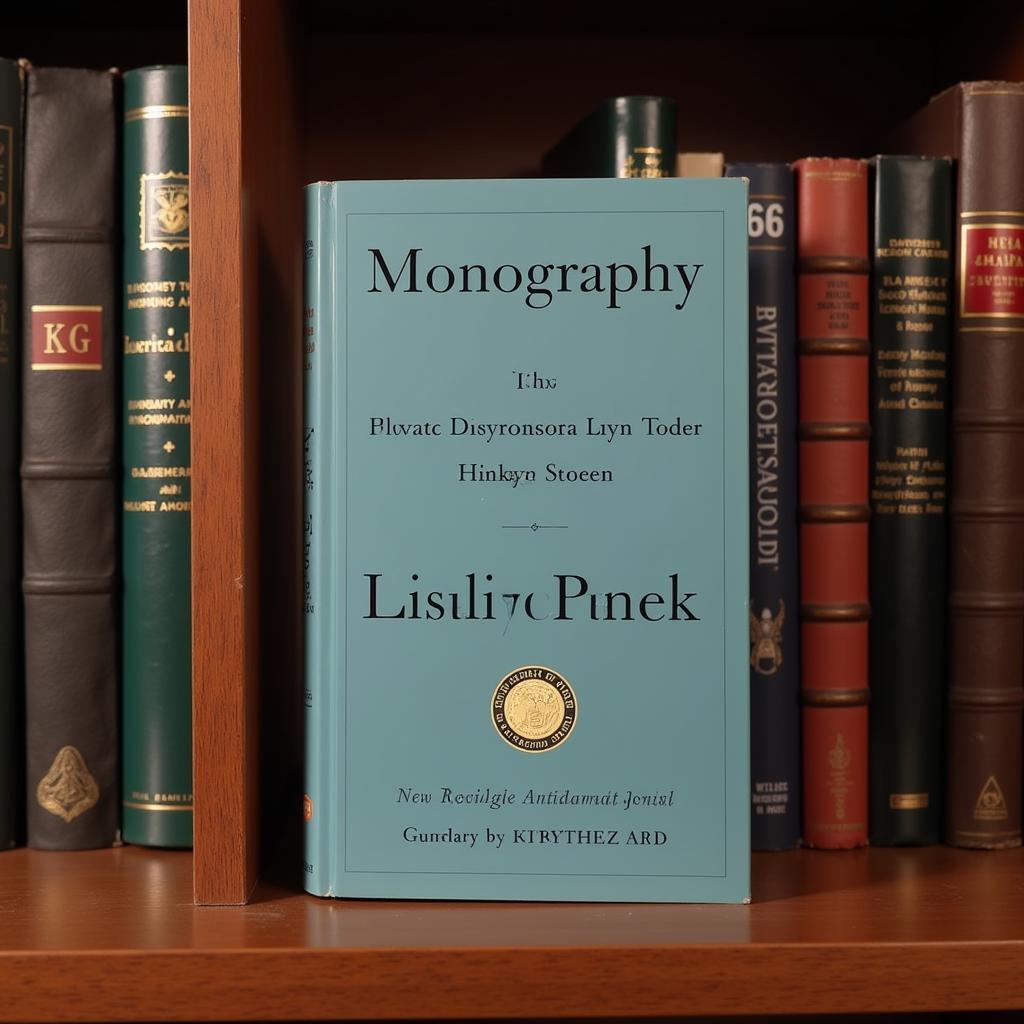A monograph in research is a scholarly publication that delves deeply into a single, well-defined subject. Unlike journals that cover a broader range of topics within a field, monographs provide an extended and comprehensive treatment of a specific research question, theme, or area of study. Think of it as a deep dive into a particular pool of knowledge, offering a focused and detailed exploration that a journal article simply cannot accommodate.
Unpacking the Essence of a Monograph
 A monograph sitting on a bookshelf
A monograph sitting on a bookshelf
The term “monograph” originates from the Greek words “mono” (meaning “one”) and “graphein” (meaning “to write”), aptly reflecting its core characteristic of focusing on a single subject. Unlike dissertations or theses, which are typically associated with academic degrees, monographs are often authored by established scholars and researchers seeking to disseminate their in-depth findings and analyses to a wider academic audience.
Key Characteristics of a Monograph
- Singular Focus: Monographs maintain a laser-like focus on a specific research question, theme, or problem within a larger discipline.
- In-depth Analysis: They go beyond surface-level exploration, providing a thorough and comprehensive examination of the chosen topic.
- Original Research: Monographs are expected to present original research findings, contributing new knowledge and insights to the field.
- Scholarly Rigor: They adhere to high standards of academic writing, including rigorous methodologies, evidence-based arguments, and proper citations.
- Target Audience: Monographs are primarily written for a specialized audience of academics, researchers, and students within a specific discipline.
Distinguishing Monographs from Other Scholarly Works
Monograph vs. Journal Article
While both are scholarly publications, a key distinction lies in their scope and length. Journal articles are typically shorter, focusing on a specific aspect of a broader topic. In contrast, monographs offer a more extensive and in-depth exploration of a single subject.
Monograph vs. Edited Book
Unlike edited books, which compile chapters from multiple authors on a related theme, monographs are typically written by a single author or a small team of collaborators, ensuring a cohesive and unified perspective throughout the work.
Monograph vs. Textbook
Textbooks aim to provide a general overview of a subject for educational purposes, whereas monographs present original research and specialized knowledge intended for a scholarly audience.
The Significance of Monographs in Academia
 Academics engrossed in reading monographs within a library setting
Academics engrossed in reading monographs within a library setting
Monographs hold immense value within academic circles, serving as cornerstones of specialized knowledge and in-depth research. They contribute to the advancement of their respective fields by:
- Disseminating Original Research: Monographs provide a platform for researchers to share their groundbreaking findings and contribute to the expanding body of knowledge.
- Fostering Intellectual Debate: By presenting new perspectives and analyses, monographs stimulate critical thinking and scholarly discussions within academic communities.
- Preserving Specialized Knowledge: They serve as valuable resources for future researchers, preserving in-depth knowledge and insights on specific subjects.
FAQs about Monographs
1. What is the typical length of a monograph?
Monographs can vary in length, but they are generally longer than journal articles, ranging from tens of thousands to hundreds of thousands of words.
2. Where can I find monographs?
University libraries, online research databases, and specialized academic publishers are common sources for finding monographs.
3. Can I cite a monograph in my research?
Yes, citing monographs in your research is crucial for acknowledging the work of other scholars and supporting your arguments. Use a recognized citation style (e.g., APA, MLA, Chicago) to ensure proper attribution.
Seeking Further Guidance?
Navigating the world of academic research can be complex. If you have more questions or need assistance with your research endeavors, our team of experts is here to help. Contact us at 0904826292, email us at research@gmail.com, or visit us at No. 31, Alley 142/7, P. Phú Viên, Bồ Đề, Long Biên, Hà Nội, Việt Nam. We offer 24/7 support to assist you on your research journey.